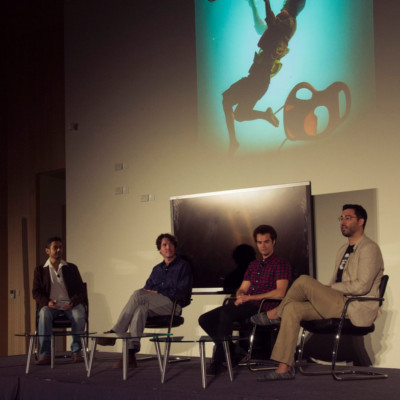Using AI to control energy for indoor agriculture
30 September 2024
Published online 4 March 2015
The Middle East’s first science film festival hopes to inspire more scientists to look to art to communicate their work.

© Alexis Gambis/Nature Middle East
The brainchild of Alexis Gambis, a visiting professor of biology and film at New York University Abu Dhabi, the festival focused on themes Gambis and his team felt were relevant to the region, such as water security and the interface between nature and technology. “Abu Dhabi is an interesting site because it sits at the intersection of a very rich history and the emergence of new technology and modernity, coupled with questions of sustainability,” Gambis said.
His idea for the festival came about eight years ago in a university dorm in New York, and since then it has become notable on the arts calendar. This event took a year of preparation by an international team of programmers, curators and communicators who collated four feature films, 84 short films, and organised panel discussions and an accompanying art exhibition.
Gambis said: “I was motivated to challenge the way science and scientists are depicted in mainstream media, notably film and more broadly visual media.
“The most important aspect of any science film is the ability to tell a good story and to effectively deconstruct and humanise the science and scientists so people understand issues and the scientific process. The audience should also realise that science is directly embedded in their everyday lives,” he added.
“Scientific narratives seem like a natural bridge to really wrap our heads around this moment of transition, tradition and future prospects.”
With water insecurity one of the hottest topics in the Middle East, the festival fittingly opened with the stunning Watermark film, which explores human relationship to water from a source of life to a source of worship. It was followed by a panel discussion that brought together marine biologists and artists to discuss climate change, sustainability and coral reefs conservation.
“The thing I love most about art is how science helps us have an objective look at things, but then art is the perspective through which we see this objectivity,” says Lars Jans, one of the panelists and the creator of the art exhibition Haloscences.
The most important element to any science filmmaking pursuit is to create a strong narrative where one never feels lectured and free of any political or social agenda.
While there is a growing science community in the Middle East, science communication to the public is still nascent and not widespread. Gambis hopes the festival can inspire others to start looking at film as a medium to communicate science to a wider audience. “Everyone watches films, it is a very powerful tool and can both have beneficial and detrimental effects on scientific representation and understanding. So it needs to be handled with care and be accompanied with discussions.”
He said that film could be a medium for scientists to communicate about their work directly with a mainstream audience, rather than going through a science journalist or communicator. “I feel that sometimes an intermediary undermines our trust in scientists to directly interact with the public. There is no better way to get your dose of science than from the source itself. Of course, not all scientists are good communicators but with the right motivation and environment, one will be surprised.”
The festival has already sparked interested among local universities and organisations in Abu Dhabi. The audience for the first feature film on opening night packed the auditorium. The arts exhibition was crowded with children and adults admiring the stunning imagery from laboratories to colourful coral reefs, or exploring the interactive exhibits – such as a virtual reality headset or a piano that played squeaky notes from lab mice (during which none were harmed).
Emirati high school students took part in a science film competition two weeks prior to the festival, and their short films were shown during the event. Emirati NYUAD sophomore student filmmaker Shakbhout Al Kaabi produced the festival trailer as well as one of the student films about telomeres called Sequence of Life.
Gambis has plans for other parts of the Middle East and North Africa region. “I don't think you necessarily need a background in science to make a science film. The most important element to any science filmmaking pursuit is to create a strong narrative where one never feels lectured and free of any political or social agenda.”
The film festival should be a stepping stone, he contends, that will spur year-round events such as exhibitions and filmmaking workshops. “I think that the academic setting is a good place to set foot and then to begin travelling. The diversity of venues is key.”
doi:10.1038/nmiddleeast.2015.39
Stay connected: